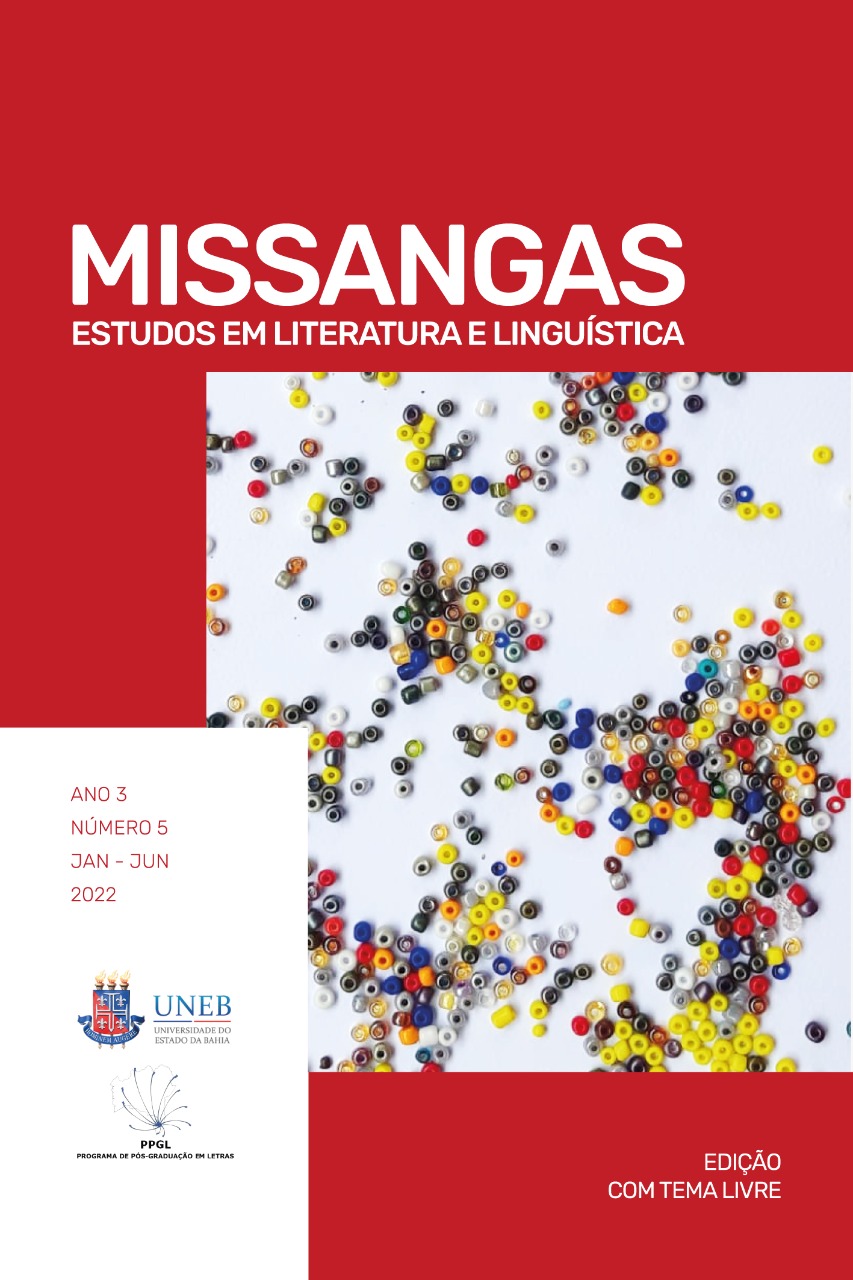O DIRETIVO E O COMPROMISSIVO COMO CARACTERÍSTICAS SUI GENERIS DA POÉTICA DE OVÍDIO MARTINS: UMA ANÁLISE LINGUÍSTICO-LITERÁRIA
THE DIRECTIVE AND THE COMISSIVE AS SUI GENERIS CHARACTERISTICS OF THE POETICS OF OVIDIO MARTINS: A LINGUISTIC-LITERARY ANALYSIS
DOI:
https://doi.org/10.53500/missangas.v3i5.14655Keywords:
Compromissivo; Diretivo; Ovídio Martins; Vertente lírica de luta.Abstract
Abstract: This article aims to demonstrate, by the means of a linguistic - literary analysis, that the lyrical aspect of the language to describe the “struggle,”used by Ovidio Martins in Caminhada (2015), is comissive and directive. A thorough analysis of the author's poetry leads us to the conclusion that his writing, on the one hand, is guided by the commitment to causes that nourish the principles of universal rights (such as freedom of expression and the struggle for emancipation) and by the attention, given to classes with underprivileged economical status. On the other hand, there are obvious signs of the author’s appeals to an injunctive linguistics expressed by a posture of contestation and rebellion - featuring an engaged literature. The author uses the above mentioned techniques in order to express his disavowal of the most unfair situations perpetuated by the oppressive regime, of which the author himself was a victim. On the textual level, there is a burst of propositional contents, such as order, advice, request, warning and admonition. Such acts are supported by linguistic tools, namely the imperative and indicative modes, the future tense, the use of pronouns in the second person, direct and rhetorical questions - they all serve as illocutionary forces for the expression of the author’s intention.
Downloads
References
ALMADA, José Luís Hopffer C. – “Que caminhos para a poesia cabo-verdiana? Antigos e recentes debates e controvérsias sobre a identidade literária cabo-verdiana.” Navegações. Porto Alegre, v. 4, n. 1, p. 92-106, jan./jun. 2011.
ALMEIDA, Carla Aurélia de – “Conselho de amigo, aviso do céu”: contributos para a análise semântico-pragmática dos atos ilocutórios de conselho e de aviso em confronto com o de ameaça”, Revista da Associação Portuguesa de Linguística -Textos Selecionados. XXXI Encontro Nacional da Associação Portuguesa de Linguística, Porto, 2016, FLUP, APL, pp. 1-29, ISSN: 2183-9077, disponível em http://ojs.letras.up.pt/index.php/APL/article/view/1534/1340
BANDEIRA, Manuel (1930) – Libertinagem, pp. 1-22. In www.castrodigital.com.br (acesso em 5.06.2021).
BRITO-SEMEDO, Manuel – Caboverdianamente Ensaiando I. Ilhéu Editora. Mindelo. Cabo Verde. 1995a.
BRITO-SEMEDO, Manuel – Caboverdianamente Ensaiando II. Ilhéu Editora. Mindelo. Cabo Verde.1995b.
BRITO-SEMEDO, Manuel – “Ovídio Martins Poesia de Amor e Luta”, in Expresso das Ilhas nº 774 de 28 de setembro de 2016.
CARREIRA, Maria Helena – “A Delicadeza em Português: para o estudo das suas manifestações linguísticas”, in MARQUES, Maria Emília Ricardo – Sociolinguística. Universidade Aberta, 1995.
COMPAGNON, Antoine – “Literatura para quê?” Tradução de Laura Taddei Brandini. Bello Horizonte. UFMG, 2009.
DEON, Robson; MENON, Maurício Cesar – “Um diálogo poético entre Cabo Verde e Brasil: Ovídio Martins e Manuel Bandeira.” Interdisciplinar. São Cristóvão, v.30, jul.-dez.p.13-29, 2018. In https://seer.ufs.br. Acesso em fevereiro de 2022.
FERREIRA, Manuel – No Reino de Caliban I. Lisboa. Seara Nova,1975.
FERREIRA, Ondina – “Evanionista? Porquê?” Expresso das Ilhas. 26 de Abril de 2006.
FONSECA, Joaquim (1992) – Linguística e Texto/Discurso – Teoria, Descrição, Aplicação. 1ª Edição. Lisboa. Instituto de Cultura e Língua Portuguesa.
INGARDEN, R. – A Obra de Arte Literária. Lisboa. Fundação Calouste Gulbenkian, 1973.
KRISTEVA, Júlia – Introdução à Seminálise. São Paulo: Debates, 1969.
LEAL, Baktalaia de Lis Andrade – “Língua e Fascismo: Configurações do olhar barthesiano”. Alfa. São Paulo, v65, 2021.
MARGARIDO, Alfredo – Estudos sobre literaturas das nações africanas de língua portuguesa. A Regra do Jogo. Edições Lda. Lisboa.1980.
MARTINS, Ovídio – Caminhada. Editorial Minerva. Lisboa 2.a Edição: União das Cidades Capitais de Língua Portuguesa (UCCLA), 2015, in https//www.uccla.pt. Acesso 21 de dezembro de 2021.
MATEUS, M.H.M et alii – Gramática da Língua Portuguesa. 6.ª ed., Lisboa. Caminho, 2003.
NOTRE LIBRAIRE – “A Morna: Música Tradicional de Cabo Verde”, nº112, Januier/Mars, 1993.
PESSOA, Fernando – Novas Poesias Inéditas. Direção, recolha e notas de Maria do Rosário Marques Sabino. Lisboa: Ática, 1973.
SEARLE, John Robert – Speech Acts: an Essay in the Philosophy of Language. Cabridge. Cabridge University Press, 1969.
SILVEIRA, Onésimo; SANTOS, H. Bettencourt - Gritarei. Berrarei. Não vou para Pasárgada. Prefácio de Onésimo Silveira e Humberto Bettencourt Santos. Rotterdam, 1973.
VEIGA, Manuel – “Signos e Símbolos em Jorge Barbosa: Uma tentativa de Análise Semiológica.” Comunicação apresentada no Simpósio Internacional sobre a Cultura e a Literatura Cabo-Verdianas. Mindelo 24-27/11/ 86, no âmbito do 50º Aniversário da Revista Claridade. In, BARBOSA, Jorge (1989) – Poesias I. Instituto Caboverdiano e do Livro e do Disco. Rua 5 de Julho. Praia. Cabo Verde, 1986.
Downloads
Published
Issue
Section
License
Os artigos publicados na revista Missangas são de inteira responsabilidade de seus autores e não refletem, necessariamente, o pensamento dos editores.


